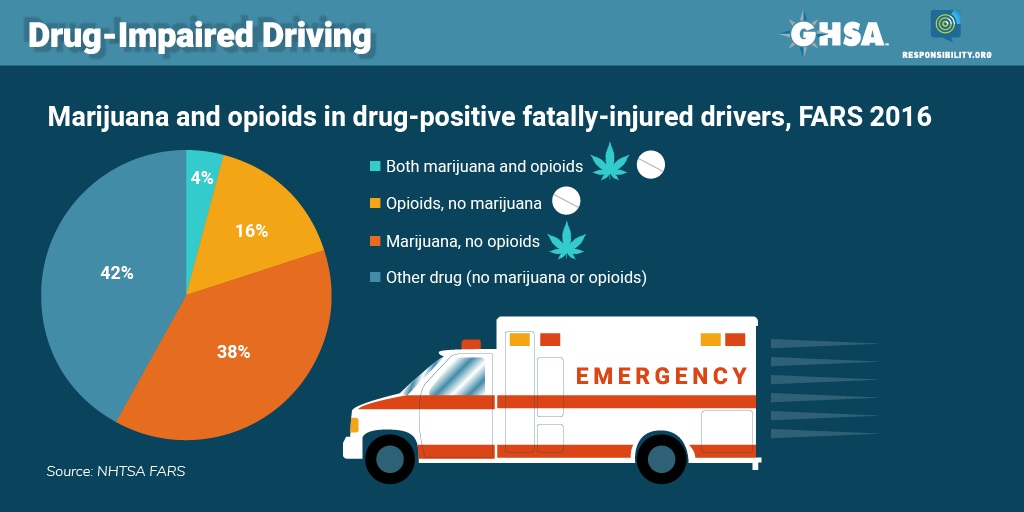Alcohol is not the only way for someone to be under the influence. A person driving under the influence of illicit substances, prescription medication, or over-the-counter medication can be as dangerous as a drunk driver. UnderFloridalaw, an officer may charge a person with a DUI if they catch them driving under the influence of alcohol or controlled or chemical substances. Like how you may consider a person who drives under the influence of alcohol as a “drunk driver,” you can regard a person who drives under the influence of drugs as a “drugged driver.”
The Florida Department of Highway Safety and Motor Vehicles (The FLHSMV) reports that in a single year (2016), “drug-impaired drivers caused 934 crashes, killing 440 people, including themselves, their passengers, and others on the road.” This disturbing data underlines the importance of spreading awareness about the dangers of drugged driving.
Illicit Substances And Drugged Driving
When learning about an accident involving a drugged driver, your assumption may be that driver was under the influence of an illicit substance. Illicit substances refer to substances that are addictive and illegal, like cocaine, heroin, or meth. You may also refer to illicit substances as controlled substances. To clarify, controlled substances refer to illegal and prescription drugs under the regulation of the Controlled Substances Act (CSA). Some of the drugs regulated by the CSA include Xanax, Codeine, and PCP. Even if you are legally prescribed a controlled substance by a medical professional, your prescription medication could impair your ability to drive.
Side Effects Of Prescription Medication To Look Out For
Prescription drugs may cause impairment on their own. Additionally, prescription drugs taken along with other medication and/or alcohol may cause even worse impairment. Talk with your medical provider about the potential side effects of your prescribed medication. Whether you are taking a newly prescribed medication or a higher dose, you must first assess how that medication affects your cognition before driving. You must do this especially if your prescribed medication is a controlled substance like hydrocodone or valium. Additionally, you want to check your prescribed medicine bottle for warnings. Watch out for phrases such as “do not take with alcohol,” potential side effects, and “do not operate heavy machinery”. It is important to know that the law considers driving to be operating heavy machinery.
Driving And Medical Marijuana Don’t Mix
Recreational use of marijuana is illegal in Florida, whereas medical marijuana treatment is legal. Yet, driving under the influence for any reason is illegal. It’s still illegal for you to drive under the influence of marijuana even if you have a medical license. You should consult with your medical provider about potential side effects.

The Hidden Dangers Of Over-The-Counter Medication
You probably aren’t asking yourself if the nasal spray you bought at your local pharmacy will affect your driving. To clarify, commonly used over-the-counter medications, like cold and allergy medicines, can put drivers at risk. Such medications can cause side effects like drowsiness, nausea, and blurred vision. When you take an over-the-counter medication, it’s best to check the bottle for warnings about potential side effects before driving.
Punitive Damages In Drugged Driving Accidents
When you’re injured because of another person’s carelessness, you deserve full compensation. Because of the 2020 Florida Statutes, Title XLV, Chapter 768, you have the ability to file a claim for punitive damages if you have been in a car crash caused by someone else’s negligence and you can prove that that person was under the influence at the time of the incident. Punitive damages refer to financial compensation awarded to the plaintiff on top of the compensation awarded for actual damages. The law considers punitive damages to be punishment for the at-fault party. A judge or jury may award them if they determine that the defendant’s behavior at the time of the incident was especially harmful. This could be because the defendant was under the influence of illicit substances or prescription medication at the time of the incident, for example.
Injured By A Drugged Driver? We Can Help
If you find yourself in a situation where you or a loved one are injured in a car crash because another person was driving while drugged, then you’ll need the advice and help of a Tampa car accident lawyer to help you get the financial compensation you deserve. You are already worrying about your health, finances and other stresses arising out of the accident. So, let us take care of the legal action. Contact us today for a free consultation.